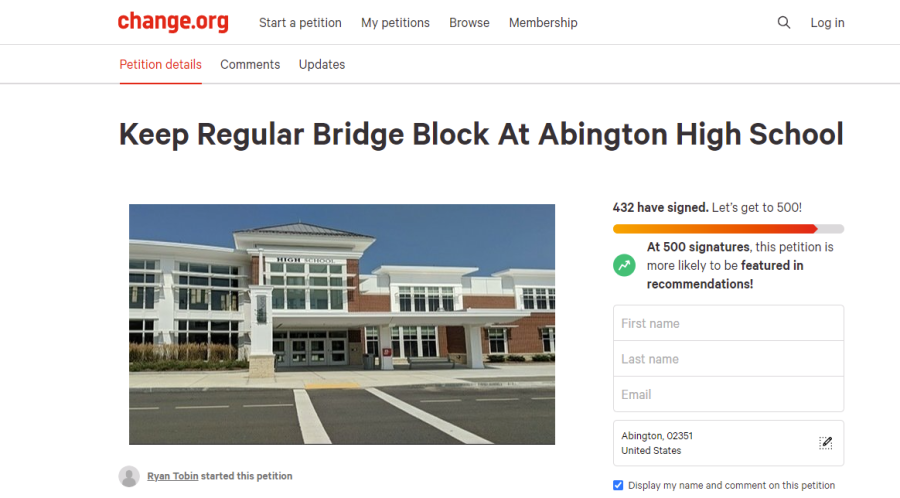United Against Change
Students Respond to the Proposed Changes to Bridge Block
Proposed Bridge Block changes at AHS inspire widespread student action
Unless you’ve been living under rock, you’ve most likely heard about the new Bridge Block change that is being introduced at AHS this coming week. Most students have settled into the current Bridge Block format, where on Fridays they schedule teachers to visit for intervention the next week. Whether they use the time to get extra help or to just get work done, Bridge Block has been working out for our student body. Or has it?
Principal Bourn, along with the school administration, has made the decision to change the structure of our beloved Bridge Block. With the new model, each department of teachers will have a designated “intervention day” in which teachers in that department preselect 5-15 students who need extra help to attend their class during Bridge period. At the same time, another department will have a “study day” where 25 students – at random- are put with those teachers for a study.
For example, Monday could be an intervention day for the History department, and also a study day for the Math department. This means that student options will now be limited to seeing either their Science, Foreign Language, English, or elective teachers. The students of AHS were devastated by the change and did not hold back from speaking their mind.
Senior Ryan Tobin was the first to act, creating a petition titled “Keep Regular Bridge Block at Abington High School”. The petition spread like wildfire, racking up over 400 signatures in under three days. Tobin argues that “there is no need to fix a system that is not broken.”
Many others feel the same way, with dozens of comments from students and parents expressing similar concerns. Tobin also added “some kids utilize bridge block, and some don’t: hindering the scheduling format is not going to change that.” Realistically, this statement makes a lot of sense. Just because teachers can now choose a limited number of struggling students and make them do their work might not change anything. Ryan also adds “It is also surprising to see the decision being put forth despite the dismay from both students and teachers.”
In addition to Tobin’s petition, Dr. Gonsalves’ 5th period class met with Mr. Bourn to have an open forum discussion, led by senior Ava Reid. Principal Bourn has also met with many other individual students, working to clear up confusion and answer any questions.
With all this action, I decided to meet with Mr. Bourn myself and discuss the pushback against the restructured Bridge Block. Despite the negative comments, Principal Bourn remained very optimistic towards our student body’s effort. When asked how he was dealing with the petition feedback, he responded “I was, if I’m being honest, very encouraged by the petition…I was honestly very proud of the study body for doing that.” When asked for clarification on why the administration felt justified in making this change Bourn explained that “when we did the student survey back in November-December, the overwhelming feedback from students was [they] use it as a quiet place to get work done. So, we were thinking we weren’t really disrupting the student situation much at all.”
Though survey results do match up with this reasoning (as over 50% of the respondents replied that they use Bridge period as a place to get work done) even if students only use the period for this purpose, it is possible they book classrooms or teachers with which they feel comfortable. One overarching concern of the restructured Bridge period is being stuck in a study with a random teacher, which could affect students’ ability to concentrate and decrease their comfort in school during an already challenging year. However, Principal Bourn did say that nothing is “set in stone” and that his “number one mission is to get a diploma in every kid’s hands.”
As we inch closer to the first day of this new Bridge Block, the entire building is on edge about whether it will work or fail. Though the petition was not successful in stopping the change, it taught our student body something important: unity. We all learned to come together as one and stand up for something we believed in. Just because we weren’t successful doesn’t mean we should give up, and that is something we can all admire about our school community.

